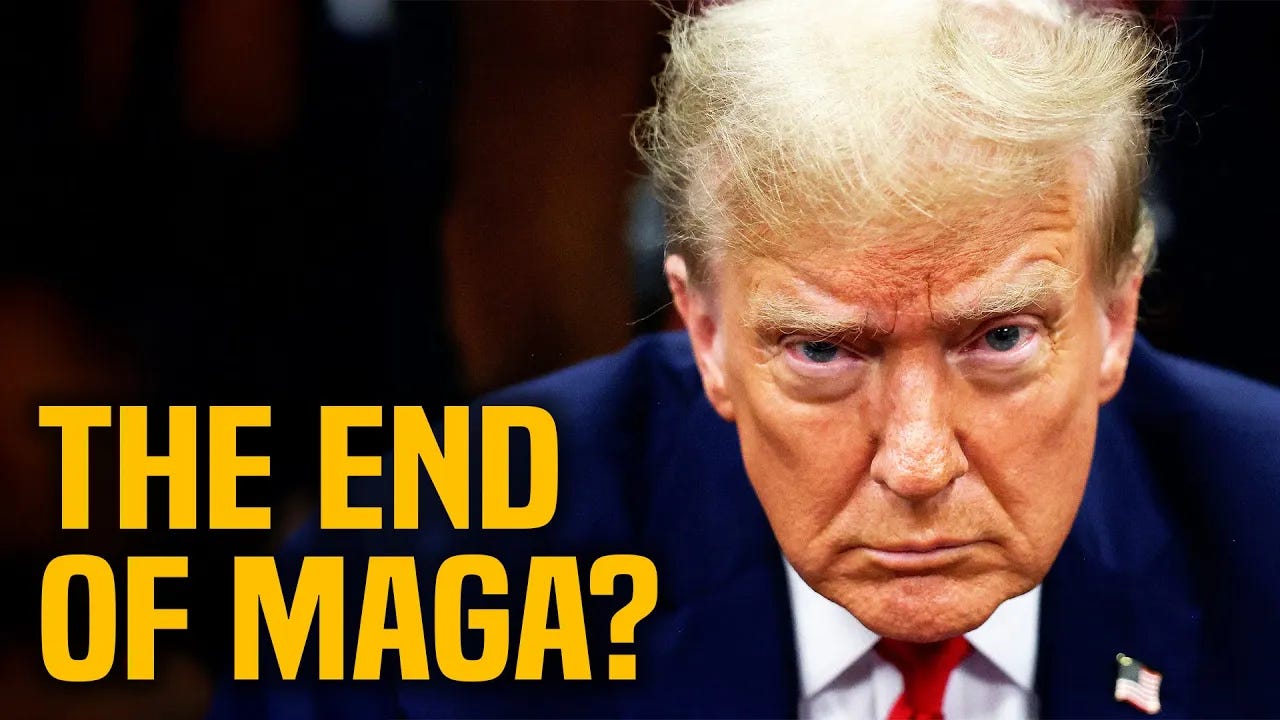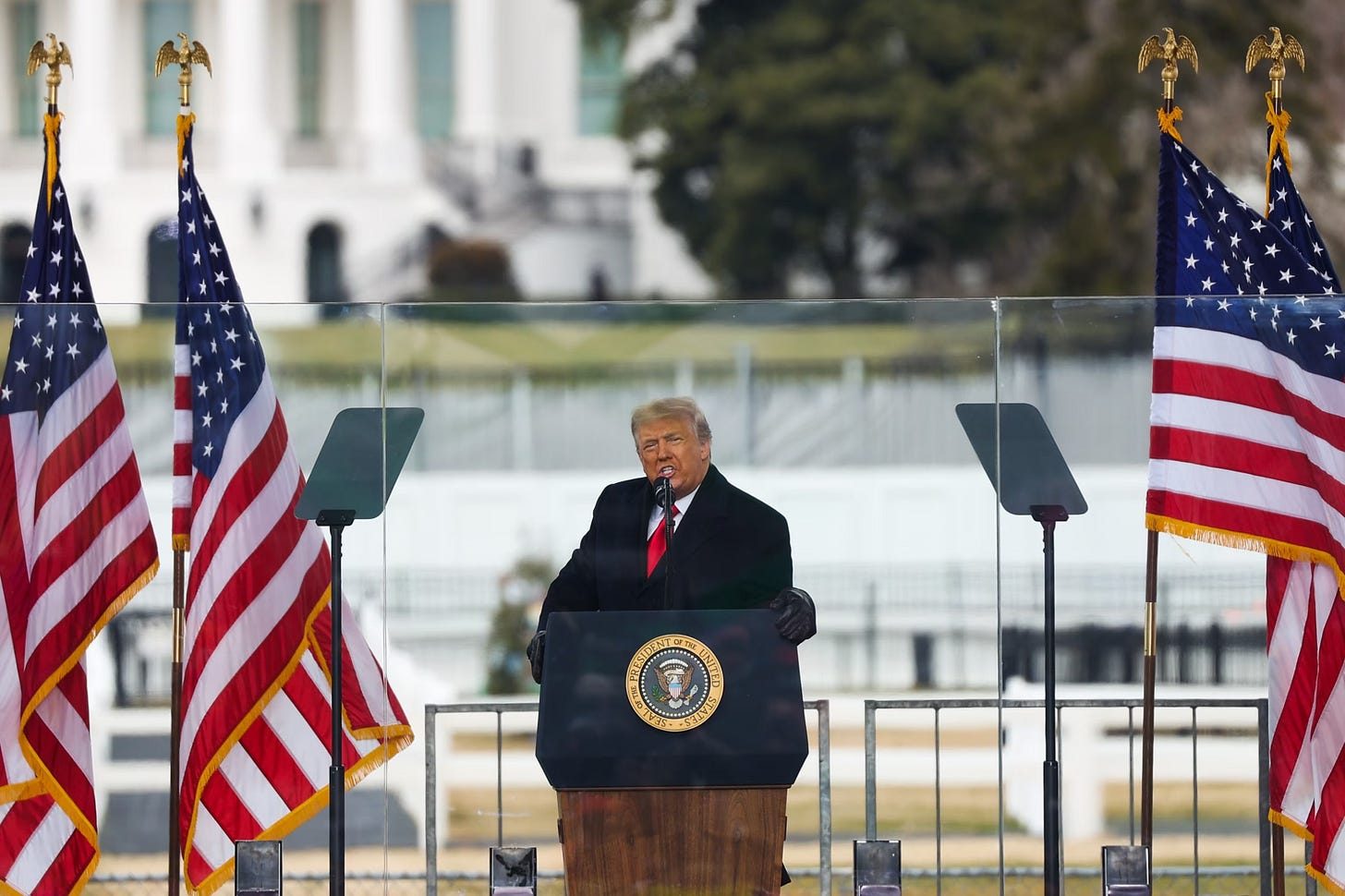EDITORIAL: Could this be THE END of MAGA Trumpism?
The future of the GOP depends on November
As the 2024 election approaches, the Republican Party stands at the most pivotal crossroads it has faced in a generation. It is a moment fraught with existential questions not only about the party’s political direction but also about its moral compass—assuming it still has one. Now, as the election looms, the stakes are clear: will the GOP double down on Trumpism, or will it stagger toward some semblance of its former self, however diminished?
Donald Trump’s iron grip on the party remains as undeniable as it is disturbing. To his legions of supporters, Trump is not merely a candidate; he is a demigod, infallible and essential to America’s future. But as we approach November, the GOP’s future—and indeed, Trump’s legacy—hinges on whether he can once again cheat political gravity and win. Should he lose, the party will face a reckoning. Whether Trump’s influence endures will depend on whether he wins, narrowly loses, or is soundly defeated. Each outcome will chart a dramatically different course for the GOP, for Trumpism, and for the broader landscape of American politics.
Let’s consider the possible futures—and how each one could alter the trajectory of American conservatism.
Scenario 1: Trump Wins
If Donald Trump pulls off a victory in November, the immediate implications for the Republican Party are brutally clear: MAGA will solidify its dominance and become the undisputed soul of the GOP. A second Trump victory would herald the ascent of an ethno-nationalist populism unmoored from facts, ethics, and even coherent governance.
Trump’s “America First” doctrine would become enshrined as more than a political catchphrase—it would be the central pillar of Republican identity for at least a generation. Those who have clung to the vestiges of traditional conservatism, those few remaining Republicans who believe in limited government, fiscal restraint, and the rule of law, would find themselves fully exiled from the party. Gone would be the days when Reagan’s “big tent” Republicanism courted both libertarians and centrists. Instead, MAGA would stand as a monument to cultural grievance, nativism, and a crude transactionalism that rewards loyalty over merit, and spectacle over substance.
A Trump victory would cement his status not merely as a two-term president but as a political kingmaker. The 2028 Republican nominee would almost certainly be an heir to Trumpism—perhaps even a literal heir, like Ivanka or Don Jr., or a more palatable proxy like J.D. Vance or Vivek Ramaswamy. With a firm grasp on the reins of the GOP, Trump would no longer be constrained by the need for re-election. Freed from accountability, he could pursue his most autocratic ambitions, whether it be stacking the judiciary further to the right, deepening America’s isolationist tendencies, or accelerating his neo-fascist immigration policy.
Likewise, a Trump victory would also cause civil war among Democrats and expose similar rifts within the party. In the aftermath of the Harris campaign’s failure, liberal moderates would likely want to move the party even further to the right in order to accommodate disillusioned anti-Trump neocons, while progressives would advocate for moving the party in a populist left direction, probably with a heavy emphasis on labor. But at least Democrats would be able to have this fight. By contrast, any Republican candidate would have to be completely servile to Trump in order to be politically relevant.
Even more worrisome, Trump's mental and physical decline would become unavoidable. Like Biden before him, Trump’s cognitive frailty would be the subject of hushed whispers on Capitol Hill, even as his die-hard supporters insisted he was as sharp as ever. The charade would continue, with Republicans trotting him out for rallies, a shambling figurehead for a movement that, in its twilight, still burns with the same resentments that animated it in 2016.
Scenario 2: Trump Loses Narrowly
Should Trump lose by a narrow margin, the most predictable thing about the aftermath would be its unpredictability. One thing is certain: Trump will not accept the results, at least not quietly. Having already poisoned the well in 2020 by claiming the election was stolen, Trump’s response to a close defeat in 2024 would be to double down, claiming widespread voter fraud or “rigged” voting systems.
For Trump, every defeat is a conspiracy.
Trump’s refusal to accept the results would have profound consequences for the Republican Party. While some establishment Republicans—like Senate Minority Leader Mitch McConnell or former Vice President Mike Pence—might urge Trump to respect the outcome, MAGA loyalists would likely rally behind his claims of a rigged election. This could fracture the party, with traditional Republicans seeking a path forward without Trump and the MAGA base continuing to champion his cause.
What would emerge from this chaos is a GOP that is even more fractured than before. As the 2028 primary season heats up, the party would be at war with itself, torn between MAGA true believers and those who yearn for a return to “normalcy.” Trump’s movement, however, would not die. Ron DeSantis, J.D. Vance, Vivek Ramaswamy, Marjorie Taylor Greene, and other ambitious Republicans would rush to fill the void, each trying to out-MAGA the other. We saw a preview of how these dynamics might work in the 2024 Republican Primary, with candidates like Mike Pence and Nikki Haley promising to herald in a post-Trump Republican Party, but this schism will likely be more intense without the presence of Trump himself as a candidate. Even as Trump’s political career comes to an end, the cult of grievance and resentment he created would remain a dominant force in Republican politics.
Scenario 3: Trump Loses Decisively
Now for the most improbable possibility: a decisive Trump loss in 2024. If Trump is soundly defeated, the psychological blow to him and his movement would be immense. Trump’s entire political brand is built on the myth of his invincibility, the idea that he is a winner, a dealmaker who always comes out on top. A landslide defeat would shatter that myth and send shockwaves through the Republican Party.
The GOP would be forced to confront the harsh reality that Trump’s brand of populism, though potent, is no longer a winning formula. His most fervent supporters would remain loyal, but the broader Republican electorate—particularly suburban voters and moderates—might finally start looking for alternatives. A decisive loss would embolden those within the party who have long despised Trump but feared the wrath of his base.
But let’s not be too quick to rejoice. The so-called “moderates” waiting in the wings are hardly moderates at all. These are dyed-in-the-wool conservatives who, for the better part of Trump’s reign, voted in near perfect unison with his agenda. Until Trump’s brazen attempt to cling to power after the 2020 election, they were perfectly complicit in his excesses, enabling him at every turn. A post-Trump GOP might look different, but it would still be shaped by the same resentments and culture wars that Trump has used to such effect.
Yet, the end of MAGA as a dominant force would nonetheless be a watershed moment. Trump himself, already fragile and declining, might be psychologically broken by such a defeat, hastening his political—and possibly even physical—decline. He would remain a loud voice, a constant thorn in the side of the Republican establishment, but his ability to control the party would be severely diminished.
For the Democrats, a massive Trump defeat might offer a brief reprieve, a chance to exploit the disarray in the GOP. But the larger forces of polarization and division that Trump unleashed won’t simply disappear. The battle for the future of conservatism will continue, and Trump’s shadow will loom large over it, even if he is no longer at the center.
The GOP’s Future
The Republican Party’s future hinges on November’s results, and the stakes could not be higher. Will the GOP remain Trump’s party, consumed by his brand of grievance politics, or will it chart a new course? A Trump victory would all but guarantee the party’s descent into authoritarian populism. A narrow loss would plunge the party into chaos, while a decisive defeat could mark the end of Trump’s dominance—but not the end of his legacy.
Whether the GOP chooses to double down on Trumpism or take a hard look in the mirror, the consequences will reverberate for years to come.







I find the thought of Trump winning depressing in the extreme. Seeing him soundly defeated is my dream. Vote Blue Always!!!!
Make no mistake: Trump is a symptom and not a cause. He became a cause also when he achieved power, but it was and is his audience that creates him, and if we defeat him and make him go away, the disease in the American electorate will just come up with another malignant narcisistic sociopath who will ride to power on this disease. We have to attack the cause by showing Trump's lost supporters that there is another way forward besides tearing down democracy.